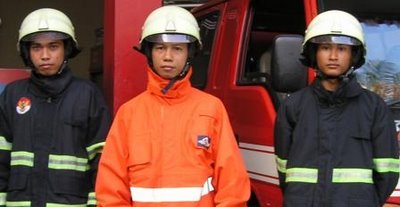 Life at the Fire Post
Life at the Fire Post By ANDREW GREENE
Friday, November 17, 2006, 12:45 PM Local Time
MAMPANG,
Ladio, Team A’s leader, remembers a fire in Manggarai, South Jakarta in 2002 in which, he says, one man’s house had already been destroyed by the time the fire truck arrived on the scene. “He was very angry and wanted everyone else’s house to burn too. He blocked our truck’s path.”
“After we were eventually able to connect our hose, he cut it. Fifteen to 20 houses ended up being destroyed and all the residents were enraged. By the time we returned to the fire post we had been attacked with fists, knives and sticks and all of truck’s windows had been smashed.”
Even when not facing the wrath of the people, fighting fires can be tough and dangerous work. Last year a Block M market burned for three days, killing
The city’s lack of firefighting infrastructure also presents the team with a variety of challenges. Though some of
When hydrants are not accessible, other sources of water must be found. Firefighter Ahmad Gozali says, “In many areas we’re forced to pump water from the canals or from anywhere we can find it. As a last resort, we carry foam that is normally used for fighting oil-based fires.”
Getting to the fires can be difficult too. The standard for all of
Ladio says Team A averages less than 15 minutes arrival time adding, “I wish that other drivers would respect the siren more and make way for our truck.”
Ordinarily, Team A does not fight many fires. They have not been on a call since late October and average only one or two responses a month.
Calls do not often come in. “I would like people to know that they need to call us on 113 when there is a fire,” says Gozali, 22, a second-generation firefighter originally from the
Three teams, A, B, and C, work out of the Mampang Fire Post. Each team consists of a leader, a driver, and three fighters. The teams work 24-hour shifts starting at nine each morning before receiving 48 hours off.
Ladio, the only married member of his squad, has been a firefighter for nearly two decades and A’s leader for five years. Their driver is 23-year-old Denny Wahyudi, a Sukabumi native and a rookie with a year’s experience. The firefighters are Rahmat, 26, Ahmad Gozali, 22, and Rizal, 20, who have all been in the profession for less than three years.
Ladio explained that
Unfortunately for the posts, only the firefighting centers and sector houses are equipped with traditional fireman poles.
When not out on calls, Team A keeps busy doing physical fitness, training, cleaning and performing maintenance on the fire post and their equipment, watching TV, and teaching the community about fire prevention.
“People need to use standard electrical cables and not to overload household sockets,” says the Yogyakarta-born, 42-year-old father of two, Ladio. “Also, many fires are caused by the careless use of cooking fires and kerosene lamps. We try to spread awareness about how dangerous these items are.”
The Jakarta Fire Agency was quoted by The Jakarta Post as having recorded nearly 500 fires last year, “mostly caused by electrical short circuits or stove explosions.”
About twice monthly, kindergarten and elementary school children visit the fire post. “The children love visiting,” says Ladio, his youthful face lighting up with the memory. “They love to climb aboard the truck and it is good for us and society for them to learn about fire safety and how to contact us.”
There are numerous obstacles to becoming a firefighter in
The actual training begins with three-months of theoretical and practical firefighting education. “Learning to survive and work in a smoke-filled room is the most difficult,” says Gozali. “It’s dark, hot, and even with the breathing apparatus, very hard to breathe. Mentally, it’s very stressful.”
Following this training the candidates are assigned to a fire post where they are given half a year’s worth of on-the-job experience. Once this is finished, they officially become firefighters.
With the amount of time off that firefighters get, it is not uncommon for them to have second jobs. Rizal says that many firefighters, though reportedly no one from Team A, work as fire security personnel for hotels and other private companies.
Today, Mampang Fire Post waits for its call. The five-year-old Isuzu Ziegler fire truck, smaller than a
Ignoring the televised game, Ladio reflects for a moment, leans back, grins, and answers that he is satisfied with his career. “I joined because I wanted to help people. And, I know that we are doing just that.”
This article was first published in The Jakarta Post 20 November, 2006.


2 comments:
nice article.
btw, why are you posting it in red? it's a tad hard to read.
Hello Treespotter,
Glad you liked it. Yeah, the red is hard on the eyes but I was trying to stay with the firefighter theme. Maybe I'll change the colour later...
Post a Comment